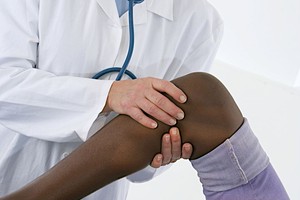July 1st, 2015
Information on Lateral Collateral Ligament Injury In South Jersey

Are you suffering from a lateral collateral ligament injury in South Jersey? We at Rothman Orthopaedic Institute are here to help.Common in sports or contact injuries, a lateral collateral ligament injury is caused by blows to the inside of the knee that push the knee outward resulting in one of the three different types of sprains.
Ligaments are thick, strong bands of tissue that connect bone to bone.The lateral collateral ligament runs along the outside of the knee joint from the outside of the bottom thigh bone to the op of the lower leg bone.
Grade 1 Sprain. The ligament has been slightly stretched, but still maintaining the ability to keep the joint stable.
Grade 2 Sprain. Often referred to as a partial tear of the ligament, this is where the ligament itself becomes loose.
Grade 3 Sprain. This is where the ligament has torn completely into two pieces, and is unable to keep the joint stable.
What Are The Symptoms?
- You may experience pain on the outside of your knee.
- Your knee may feel unstable, causing awareness of your knee giving way.
- There may be swelling over the injury site.
- Locking of the joint, especialy when moving.
What Can Rothman Orthopaedic Institute Do For You?
Here at Rothman Orthopaedic Institute we pride ourselves in the quality care that we provide for our patients.
During your first appointment, one of our expert physicians will ask you about your symptoms and medical history, further moving onto the physical examination. During this examination your doctor will:
- Check all the structures of your injured knee.
- Compare your injured knee to your non-injured knee.
- Take x-rays to be sure sure that the knee itself is not fractured.
- Your doctor may recommend an MRI scan to further examine the soft tissue (ligaments).
What Treatment Options Are Available?
Treatment for a lateral collateral ligament injury can range from non-surgical to surgical. Here are a few examples of what can be done.
Non-Surgical
- Physical Therapy: Specific strengthening exercises may restore your knee back to it’s former function.
- Ice: Aiding your lateral collateral ligament in the healing process can help when icing every hour for 15-20 minutes.
- Bracing: Wearing a brace may protect your injured ligament from stress. When you receive a brace it will cover both sides of your knee, to keep it in place.
Surgical
If the collateral ligament doesn’t respond to the above non-operative treatments, it will require surgery. Surgery is also recommended when the injury is associated with another ligament injury as well.
If you would like more information on how Rothman Orthopaedic Institute can provide the highest quality treatment for lateral collateral ligament injury in South Jersey, please contact us online or give us a call at 1-800-321-9999.


